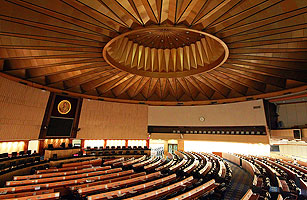
With the announcement of national elections on July 3, Thailand’s Prime Minister Abhisit Vejjajiva has placed his fate in the hands of the voters, and put the country’s developing democracy to what may prove to be a perilous test. At 8 a.m. Tuesday morning, parliament was officially dissolved after 30 months under Abhisit which were marked by bloody protests, economic crisis and deepening social and political polarization. The elections will be Thailand’s second since a bloodless military coup in 2006, and rumors of another military intervention have been rife in recent weeks. Once regarded as a beacon of stability in Southeast Asia, Thailand has been in near constant turmoil since late 2005.
The elections will “decide which direction the country is taking … whether to walk ahead … or dwell on the conflicts,” Abhisit said in announcing parliament’s dissolution. The country has become so polarized in recent years that many analysts have said the elections will not succeed in ending the bitterness. Ukrist Pathmanand, a professor of political science at Chulalongkorn University in Bangkok, is, however, more optimistic. “This is really a fresh start for our democratic process,” Ukrist says, adding that he does not think the military will intervene directly in the outcome.
A slew of parties will contest the elections, but the race will chiefly pit Abhisit and his Democrat Party against the opposition Pheu Thai party, which is led remotely by wealthy businessman Thaksin Shinawatra. The elected prime minister who was ousted by the army in the 2006, Thaksin lives abroad, having fled after being convicted of corruption and given a two-year prison sentence he did not serve. Pheu Thai’s campaign slogan is “Thaksin thinks, Pheu Thai acts,” and party executives acknowledge that Thaksin is expected to name his sister, Yingluck Shinawatra, a businesswoman with no political experience, as the party’s candidate for prime minister.
The race is too close to call. A poll conducted in April by Assumption University showed the Democrats holding a razor-thin lead with 26.4%, Pheu Thai at 25.5% and smaller parties garnering 15.4%. Undecided voters were the largest group at 32.7%. “There are so many factors that could change how voters feel between now and election day that it is simply too difficult to predict,” said a member of the government who asked not to be named because election laws prohibited him from commenting before campaigning officially began Tuesday afternoon.
Thaksin is supported by most members of the Red Shirts, named for the color they wear, who staged mass protests against Abhisit in Bangkok in 2009 and 2010, demanding that he resign and call a new poll. The demonstrations turned violent, and in May 2010 the army dispersed the Red Shirts, some of whom were armed and burned more than 30 buildings in Bangkok as they fled. Ninety-one people, mostly Red Shirts but also some soldiers, were killed during the two-month-long unrest. Although the Red Shirts were able to mobilize more than 100,000 protesters at times, a recent poll by the Asia Foundation found that only 14% of those surveyed voiced support for the group.
Abhisit became prime minister by parliamentary vote in December 2008 after a court dissolved another Thaksin-backed party that had won the previous election, for electoral fraud. Abhisit took office as the world economic crisis hit Thailand, but he steered the country through the worst of the recession and presided over a strong recovery in 2010 that saw the country register its highest growth rate in more than 15 years at 7.5%. Nonetheless, disparities in wealth, regional differences, feelings of injustice over how he rose to power and loyalty to Thaksin have left sections of the country, particularly the poor northeast, strongly opposed to Abhisit.
Thaksin, who speaks to supporters through video link speeches, most often from his main base in Dubai, has been asking voters to bring him back to Thailand by electing his party members, while promising free government-issued credit cards to farmers and taxi drivers, and promising debt forgiveness. He inspires opposition from many urban middle class voters who resent his populism and feel he is an authoritarian, traditionalists who claim he is disloyal to the country’s constitutional monarchy, and members of the military who fear he will seek revenge over the 2006 coup that ousted him.
During his last year in power Thaksin faced constant street protests from opponents called the Yellow Shirts for the color of their garb, and who wanted a military or royal intervention to remove him. After his ouster, Red Shirts have staged repeated protests demanding new elections. Most polls show most Thais are fed up with color-coded street protests. The test for Thailand’s democracy is whether the outcome of the upcoming elections will be accepted by those who lose, or serve as a spark for a new round of violent street protests that further destabilize the country.
See TIME’s Pictures of the Week.
See the Cartoons of the Week.